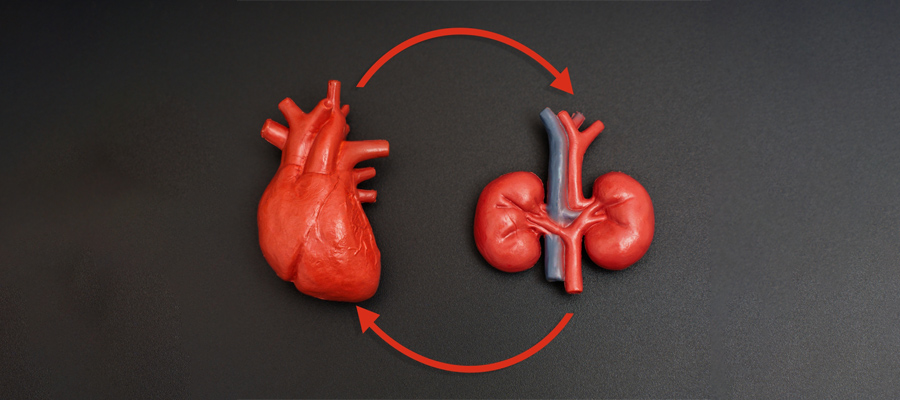As the name suggests, Cardiorenal Syndrome (CRS) represents a deep connection between the heart and kidneys. The connection is proportional, meaning that failure in one organ leads to the other organ. As complex as it seems, it is even harder to treat, increasing complications in prognosis and treatment.
In this blog, we’ll explore what is cardiorenal syndrome, delve into its types, causes, and symptoms, and provide a detailed look at treatment for cardiorenal syndrome. We’ll also discuss the often-asked question: what is cardiorenal syndrome life expectancy?
What is Cardiorenal Syndrome?
Cardiorenal syndrome is a disorder that involves both the heart and kidneys. An issue with one organ significantly affects how well the other works. These issues can be both short-term (acute) and long-term (chronic).
Your heart and kidneys jointly manage your blood. Your kidneys filter waste from your blood, while your heart pumps blood throughout your body. However, your kidneys also regulate the amount of water and salt that you expel from your body through urine. Your blood pressure and the amount of fluid your body retains are impacted by this.
Moreover, understanding what is cardiorenal syndrome is crucial because misdiagnosis can lead to improper treatment and worsened outcomes. It’s not merely a coincidental occurrence of two organ failures, but a synergistic pathology that requires integrated care.
Cardiorenal Syndrome Types
The cardiorenal syndrome types are classified into five categories based on which organ is primarily affected and whether the condition is acute or chronic:
- Type 1 (Acute Cardiorenal Syndrome): Acute heart failure leads to acute kidney injury.
- Type 2 (Chronic Cardiorenal Syndrome): Chronic heart failure causes progressive kidney disease.
- Type 3 (Acute Renocardiac Syndrome): Acute kidney injury triggers acute heart dysfunction.
- Type 4 (Chronic Renocardiac Syndrome): Chronic kidney disease contributes to decreased heart function.
- Type 5 (Secondary Cardiorenal Syndrome): Systemic conditions (e.g., diabetes, sepsis) simultaneously damage both organs.
Each of these cardiorenal syndrome types requires a unique treatment strategy. Proper classification allows physicians to create targeted treatment plans and improve patient outcomes. Moreover, talking about chronic conditions, you might want to learn about chronic diastolic heart failure.
What Happens in Cardiorenal Syndrome?
Cardiorenal syndrome is a complicated condition involving your heart and kidneys. The factors may involve:
Reduced heart rate or heart failure.
Decreased blood flow to your kidneys can harm them.
Elevated blood pressure in the vena cava (the big veins that provide blood to the heart).
Causes of Cardiorenal Syndrome
The root causes of cardiorenal syndrome are diverse and often interrelated. So, they can be categorized under umbrella terms: cardiovascular, renal, and systemic factors.
| Cardiovascular Causes | Renal Causes | Systemic Causes |
|---|---|---|
|
|
|
The common thread in these causes is the imbalance they create in blood flow, pressure regulation, and fluid volume, all critical factors that affect both heart and kidney function. Understanding the cause is vital for developing an effective treatment for cardiorenal syndrome.
How Common is Cardiorenal Syndrome?
People experience problems with both their kidneys and heart at the same time more often. Approximately 64 million people worldwide suffer from heart failure. Between 45% and 63% of patients with chronic heart failure have kidney dysfunction, according to medical professionals. It can be challenging for healthcare professionals to determine which organ had problems first.
What is Cardiorenal Syndrome Life Expectancy?
Cardiorenal Syndrome (CRS) significantly impacts life expectancy due to the interconnected nature of heart and kidney failure. While full recovery is unlikely, treatment can manage symptoms and support organ function. The median survival for patients with heart failure and chronic kidney disease is around 2.2 years, according to Revival Research Institute, LLC, and less than 15% of dialysis patients with heart failure survive 3 years after hospitalization for heart failure.
Cardiorenal Syndrome Symptoms
Recognizing cardiorenal syndrome symptoms early can be lifesaving. However, symptoms are often nonspecific and resemble those of either heart or kidney disease. The overlap can delay diagnosis.
Common Symptoms Include:
- Shortness of breath
- Fatigue and weakness
- Decreased urine output
- Chest pain or discomfort
- Swelling in legs and ankles (edema)
- High blood pressure or hypotension
- Rapid weight gain due to fluid retention
- Nausea and confusion (in advanced cases)
Because cardiorenal syndrome symptoms often mimic those of heart failure or kidney failure alone, patients and clinicians need to remain vigilant. Regular checkups, especially for those with a history of cardiovascular or kidney issues, can help catch early warning signs.
Diagnosis of Cardiorenal Syndrome
Diagnosing cardiorenal syndrome involves a combination of clinical evaluation, imaging, and laboratory tests. Doctors often rely on a patient’s medical history, especially any known heart or kidney conditions.
Diagnostic Tools Include:
- Blood Tests: Measure creatinine, BUN (blood urea nitrogen), electrolytes, and cardiac markers like troponin.
- Urinalysis: Detects proteinuria or other abnormalities.
- Echocardiogram: Evaluates heart function and structure.
- Chest X-ray: Checks for pulmonary congestion or heart enlargement.
- Kidney Ultrasound: Assesses kidney size and structure.
It’s important to differentiate cardiorenal syndrome from isolated cardiac or renal diseases to ensure proper management.
Treatment for Cardiorenal Syndrome
Effective treatment for cardiorenal syndrome aims to manage both heart and kidney dysfunction simultaneously. The challenge lies in the fact that medications beneficial for one organ may worsen the condition of the other.
Common Treatment Strategies Include:
Diuretics
- Used to remove excess fluid and relieve symptoms of congestion.
- It must be monitored carefully to avoid dehydration and worsening kidney function.
ACE Inhibitors / ARBs
- Lower blood pressure and reduce heart strain.
- Also helps slow the progression of kidney disease.
- Require monitoring of potassium levels and kidney function.
Beta-Blockers
- Improve heart function and control arrhythmias.
- Must be used cautiously in patients with low blood pressure or worsening renal function.
SGLT2 Inhibitors
Originally developed for diabetes, now proven to improve outcomes in heart failure and chronic kidney disease.
Dialysis or Ultrafiltration
- For severe fluid overload and advanced kidney failure.
- Often a last resort, but sometimes it is necessary for stabilization.
Lifestyle Modifications
- Low-sodium diet
- Fluid restriction
- Smoking cessation
- Regular exercise tailored to capacity
Additionally, efforts are ongoing to help find a potent cure for cardiorenal-related conditions like chronic heart failure through clinical trials. Be a part of this breakthrough and help elevate science. Moreover, gain better care delivery and a chance to explore new therapeutic options by enrolling in the trials today.
Living with Cardiorenal Syndrome
Living with cardiorenal syndrome requires constant attention to lifestyle, medications, and follow-ups. Patient education plays a main role in managing symptoms and preventing complications.
Tips for Daily Management:
- Monitor daily weight to detect fluid retention.
- Keep your blood pressure under control.
- Avoid NSAIDs and other nephrotoxic drugs unless approved by a doctor.
- Adhere strictly to dietary and fluid guidelines.
- Stay active but avoid overexertion.
Moreover, support groups and counseling can also help patients cope with the emotional and psychological impact of chronic illness.
Final Thoughts
To conclude, cardiorenal syndrome refers to conditions related to the heart and kidneys. As complicated as it sounds, the more complicated is its diagnosis and management. Knowing about its symptoms and types, the patients and healthcare providers can work together towards effective management.
Additionally, Hightower is conducting chronic heart failure clinical trials to help find a more potent cure for those suffering. We aim to elevate healthcare and help advance research. Do you? If yes, then join us in our venture to a better and healthier future. Enroll today.




